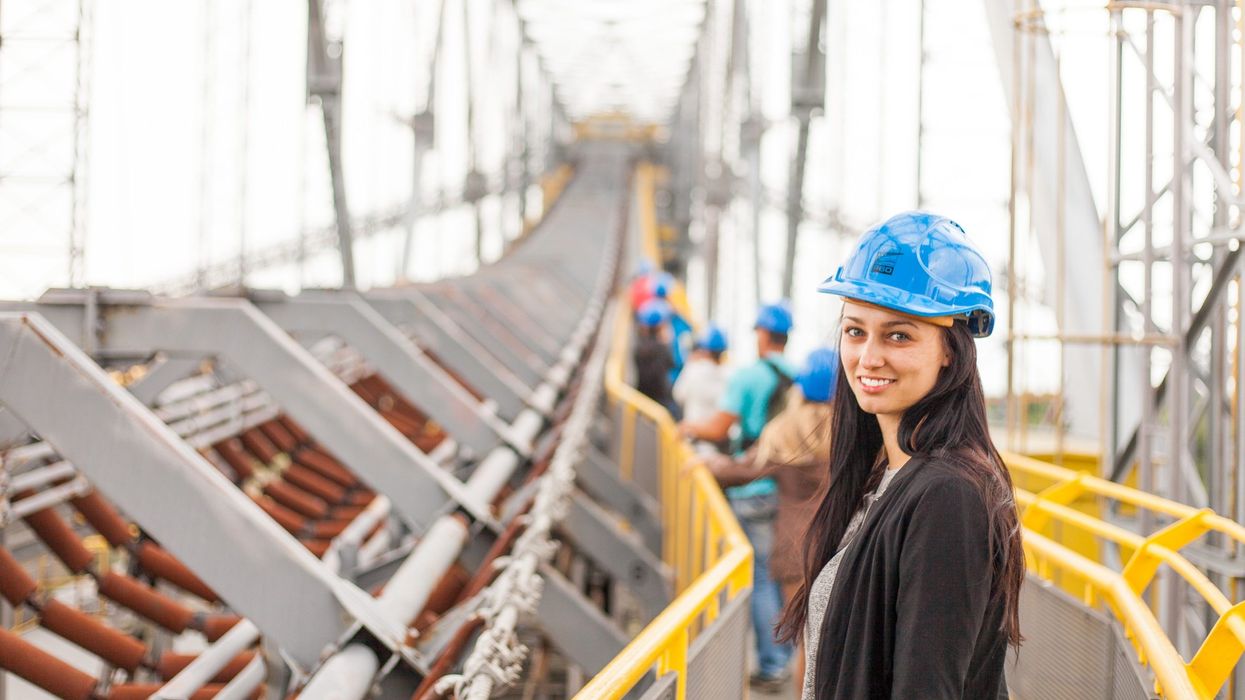Early March brought International Women’s Day and all the requisite hashtags and headlines. It was a time to reflect on how far women have come, and how much farther they have to go.
Women have been gaining ground in many male-dominated industries, including real estate, architecture and design. But the building side of the industry hasn’t seen the same interest from female candidates — an issue the Residential Construction Council of Ontario (RESCON) has been addressing in its public awareness initiatives.
Toronto Storeys teamed up with RESCON to chat with five women in construction about their work — the secret perks, the great pay, and the pride of building this city.
Julia Zahreddine is a site supervisor at Bridgecon Construction.
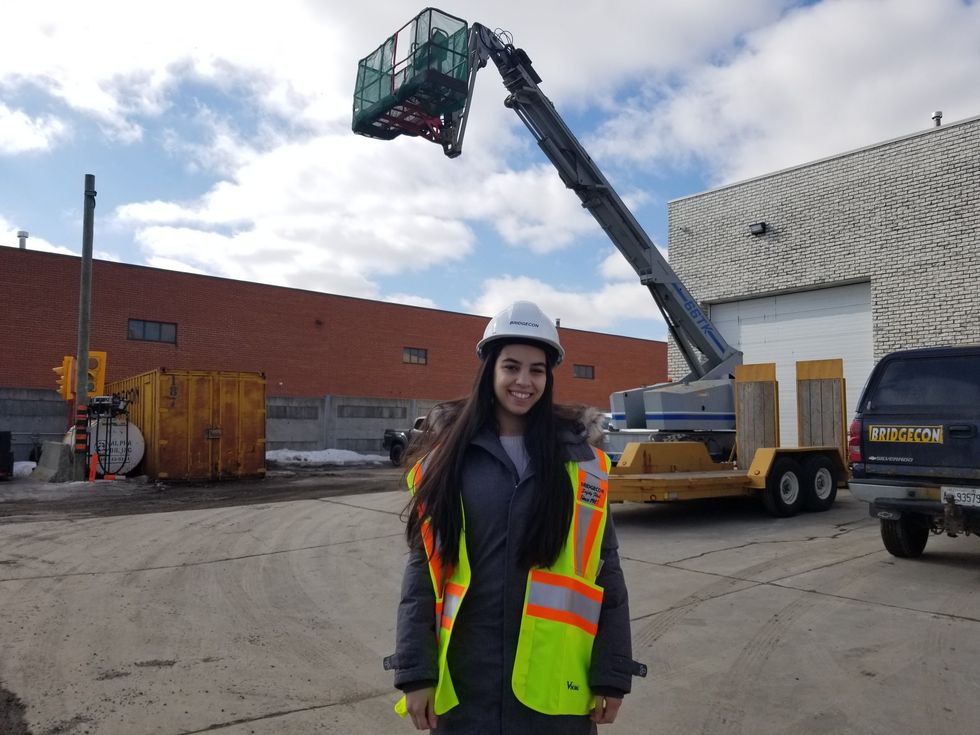
What does your role entail?
As a site supervisor at Bridgecon Construction, my role is to oversee a project onsite and that includes doing paperwork, doing permits, communicating with the owners and subcontractors, as well as making sure that everything is done as per the specifications.
But the most important role is [overseeing] the safety of everyone onsite. That includes your own workers, any subcontractors and any visitors. To ensure safety, you do hazard assessments before mobilizing the site, and then you do daily safety talks with all the workers — to make sure everyone knows what the tasks are, how to avoid any hazards, how to prevent them and how to limit them.
Has it ever bothered you that there aren’t more women in construction? Why or why not?
I wouldn’t say it bothers me. I want women to choose whatever career they’d like, but I’d want them to know that working in construction is an option. Although it’s male-dominated, there’s a lot of room for women to work here.
I want women to think of this as a career path when they’re younger and that this is something they can do, and they’re welcome to do. It’s great for women and I’d love to see more women on site.
READ: Toronto Makes Top 10 List Of Best Canadian Cities For Women
What personal qualities help you succeed in your job?
What’s helped me succeed in my job is having a strong work ethic and communication skills. You have to have the ability to multitask and problem-solve under a lot of pressure. There’s a lot of tasks that happen in one day and you need to be able to stay calm during them.
What’s a perk about working in the construction industry that most people don’t know about?
As a site supervisor, a great perk is you get the ability to work both outdoors and indoors. So, you’re not always on site and not always in an office. You get a great mix of the two — you have the onsite, overseeing things, and there are times when you’re in the trailer, communicating with other people, working on some paperwork. It’s a good mix.
There’s not as much construction done in the winter. You do have jobs where you are onsite, so it’s a little harder in the winter — then again, you are inside sometimes. So, it is still a good mix.
What makes you proud of your work?
What makes me proud is seeing the finished project. It’s cool to see something that I worked hard on.
Not every day is easy, there’s always a lot of problems, but it’s always something you can solve. Then, in the end, you get to see something that you are a part of, your team created.
It’s cool to be a part of heavy civil construction — sometimes you get to see your projects in the city. It makes you proud to know you are a part of creating something that people use, and everyone sees.
Shari Haltrecht is a health and safety manager at Tucker HiRise.
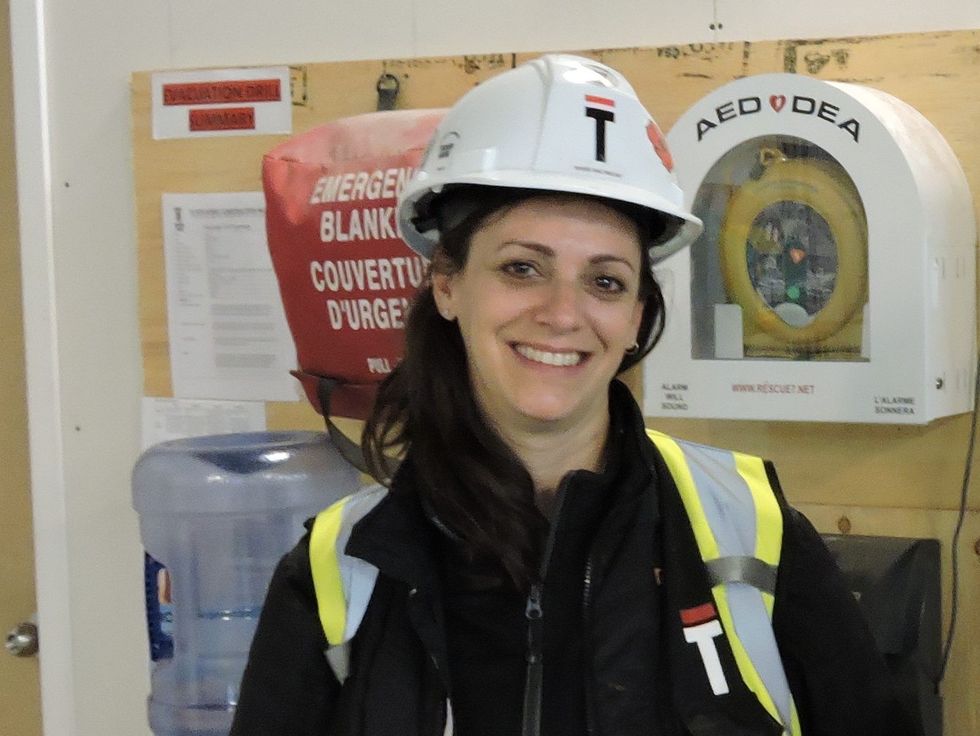
Tell me about your position with Tucker HiRise — what does it entail?
I am the health and safety manager, so I basically look after all of the workers and all of our site employees for Tucker, with regards to day-to-day operations. I’ll walk the job site and I’ll advise as to where they are compliant or non-compliant — the laws and legislation, or even just best practice.
I am responsible for the development and implementation of our health and safety program for our sites. I overlap a little bit with head office, in terms of our HR department for our employees at our head office, but my main focus is construction activity.
I am very mobile. I’m talking to you from my car/office. (laughs) Pretty much every day is at least one or two site visits and some administration work.
What personal qualities help you succeed?
You have to be a people person. You need to know how to deal with different types of people — and lots of them. Anything from your own employees to members of design teams, or members of the government. Sometimes we’ll have Ministry of Labour personnel onsite, or owners of companies — and you have to deal with them differently, obviously, than you would have to deal with the average worker or your own employees.
I always believe you get bees with honey, not vinegar. That’s always been my M.O. And I’ve been criticized in the past for being too kind and too easy, but I also believe more in training and education than I do in punitive (ways to handle) situations. I’d rather teach a guy to tie off properly than send him home.
Do you wish there were more women in construction?
The truth is, I could care less if you’re male or female. Anything goes as long as you know your stuff and you’re easy to work with. To me, gender doesn’t really matter.
I think in general it’s nice to see more women out there in the workforce and in typically male-dominated fields. I’ve been in the industry about 20 years now, and I would go into meetings 20 years ago and all eyes would turn — it would be like, ‘What? There’s a woman in this position?’
Now you walk in and maybe there are two or three other women around the table and it’s a non-issue. I don’t think gender really plays a huge role. I think it’s more important that you know your stuff.
What advice would you give to someone interested in working in construction?
I think construction as a whole, there’s a ton of opportunity in the industry.
For example, I have a degree in architecture and I got into construction to be a project manager. My career took big twists and turns and I ended up in safety — it’s not something I foresaw and it certainly wasn’t an end goal. But along the way it became clear that this was a fantastic field, with a lot of opportunity and autonomy and flexibility.
You can start in one area and see another area that interests you, and move on from there. There’s a lot of different options within construction.
(So, my advice is that) you can have an end goal, but be flexible and be open to different ideas, different opportunities. Be open to change.
What’s a perk about working in the construction industry that people might not know about?
It may be what I already touched on — the flexibility and autonomy. You can be a follower and find your niche, and you can be a leader and excel as well. You can go as far as you want in this industry.
Larissa North is a bulldozer operator at Steed and Evans.
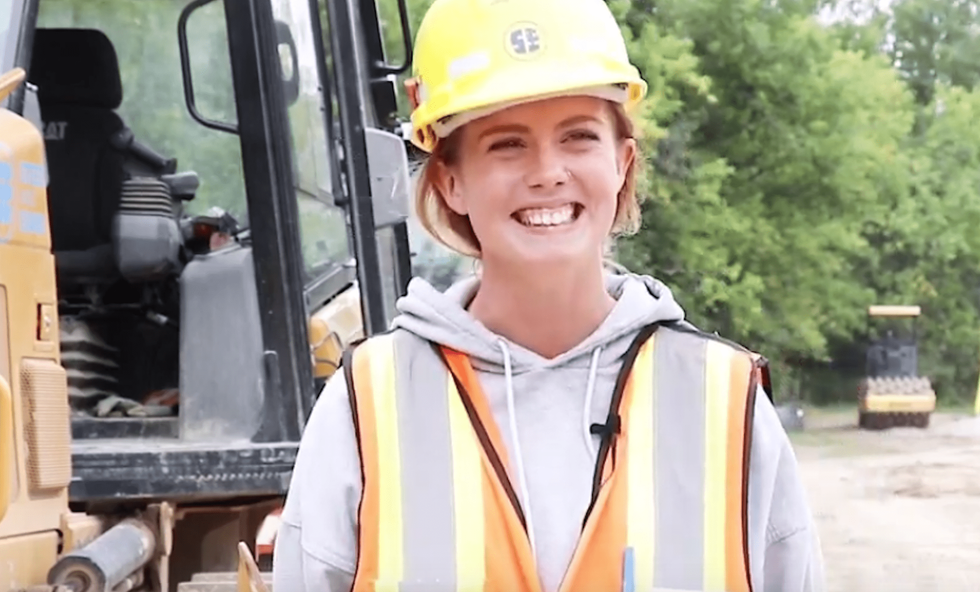
Tell me about your job at Steed and Evans. What does your role entail?
Right now I work on a grading crew, which is responsible for taking out old material in the road and replacing it with fresh gravel to a specific measurement and different slopes. My day starts with a routine check of my machine to make sure that everything is full — all the fluids in it — and that everything is running properly so I can get it through the day.
It’s my responsibility to keep everything clean and in order, so I clean my tracks at the end of the day, wipe everything down on the inside. It’s my responsibility, when the trucks come loaded, to back them up and dump them wherever it’s going to be needed. And then after that, I push the piles and then I operate a compacter, which is basically to ensure the material is going to take form and stay in place. I help keep the site clean and driveable for everybody.
Has it ever bothered you that there aren’t more women in construction? Why or why not?
I don’t think it has bothered me as much. I think that it’s a good thing that we’re seeing more women get into it because it’s available, there are resources there for everybody. And it’s a lot of fun.
I think it’s really up to the direction that you want to take for yourself. A lot of women aren’t necessarily interested in it so it’s just something to learn about.
READ: These Women Are Charting A Path In Real Estate That Many Young Women Can Follow
I’ve been told there’s a sense of community in construction. Have you felt that?
When we’re working together, we’re all doing the same thing. We all want the same outcome from it, and we’re all working hard.
Every day, being together brings about tons of conversations. You’re interacting with people you work with, so you become comfortable quickly and you get to know the people you work with and for. You’re able to enjoy each other’s company while you’re working, and sometimes afterwards too.
What’s a perk about working in the construction industry?
It keeps me focused on my job and what I want out of my own life. It gives me a routine and the reassurance that I’m going to be able to do what I want, to grow and do other things.
I have a pension from work, I’m able to save my money, I just bought a car.
What's the best part of your job?
I’m outside every day. Good or bad weather, being in the fresh air makes a huge difference on my mood and my motivation to do my work.
I’m really supported by the people I work for. And my friends and family — everyone’s always excited for me.
It’s really rewarding, seeing something I helped to complete. It’s pretty cool; it makes me want to keep doing it because (when I see finished projects) I’m like, ‘Oh, look at that!’
Amina Dibe is a policy and programs analyst for RESCON.
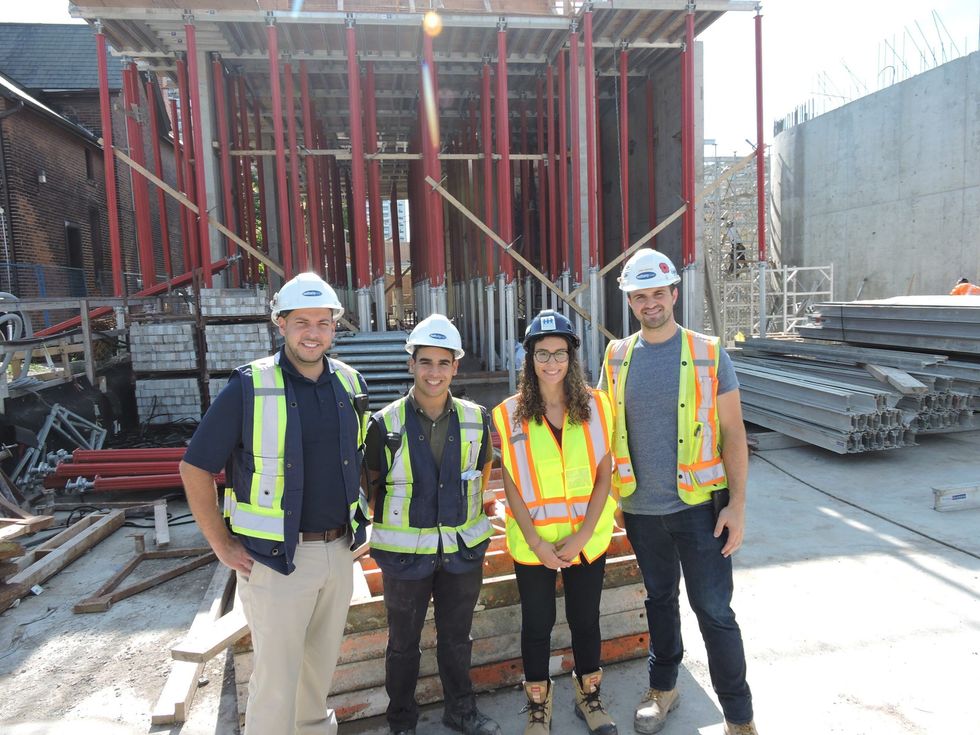
What does your role at RESCON entail?
I’m a Programs and Policy Analyst, and a lot of that is centred around training and education. We have a couple of files at RESCON and training and education is one of them, in addition to health and safety.
Right now, I’m working on two major projects. I’m looking at recruitment and retention in the skilled construction trades.
One of the projects is a partnership with Humber College, and we’ve partnered with them to place graduates from skilled trades programs within residential construction trades.
We’re seeing that there is going to be a huge amount of retirements within the next decade — and that’s Canada-wide, Ontario-wide, and within the GTA. So, we’re trying to ensure that we’re recruiting the right people into the right jobs, who will stay there and replace the changing demographic of the workforce.
The other project is a report — we’ve partnered with an organization called Job Talks — and that’s also looking at recruitment and retention, but more from a marketing and job satisfaction perspective.
There’s also a video series (produced by JobTalks, in partnership with RESCON) that profiles 50 workers in 50 different residential construction or infrastructure-related trades. We are trying to promote the jobs that not a lot of young people know about.
What personal qualities help you succeed?
Time management is huge for me because I’m juggling two very large projects. Organization. Project management — but that’s something that I’ve learned and grown upon as I’ve been working on these two projects.
And confidence. It’s not really a skill but it’s definitely something you should have in any role, and in the construction industry it’s always good to have, as a woman.
READ: Five leading ladies who inspire us on International Women’s Day
How do you think construction can attract more female candidates?
I guess programs like what we’re doing already — explaining that it’s not just a man’s job, anyone can do it if they have the right attitude.
Again, it has great benefits — that’s something that’s shown in the videos — but benefits, pay, job satisfaction, teamwork, team morale. It’s a very team-based environment, as opposed to just sitting at a desk, working independently.
We’re trying to highlight the leaders — the women leaders — in our industry for mentorship. We found that’s really an effective thing.
What’s a perk about working in the construction industry that most people don’t know about?
That’s a good question. I can’t speak on behalf of the tradespeople because I’m not in that role. But I would say the pay and the benefits and seeing the result of your work directly.
What makes you proud of the work you do?
Helping people find jobs in the industry, expanding their career options.
Seeing how it impacts young people — and it’s not just young people who are trying to get into construction work. We’re open to all ages, people who are looking to have a shift in their career, like a second career.
Joanne Bin is the executive director of the BOLT Charitable Foundation, launched in 2009 by Tridel.
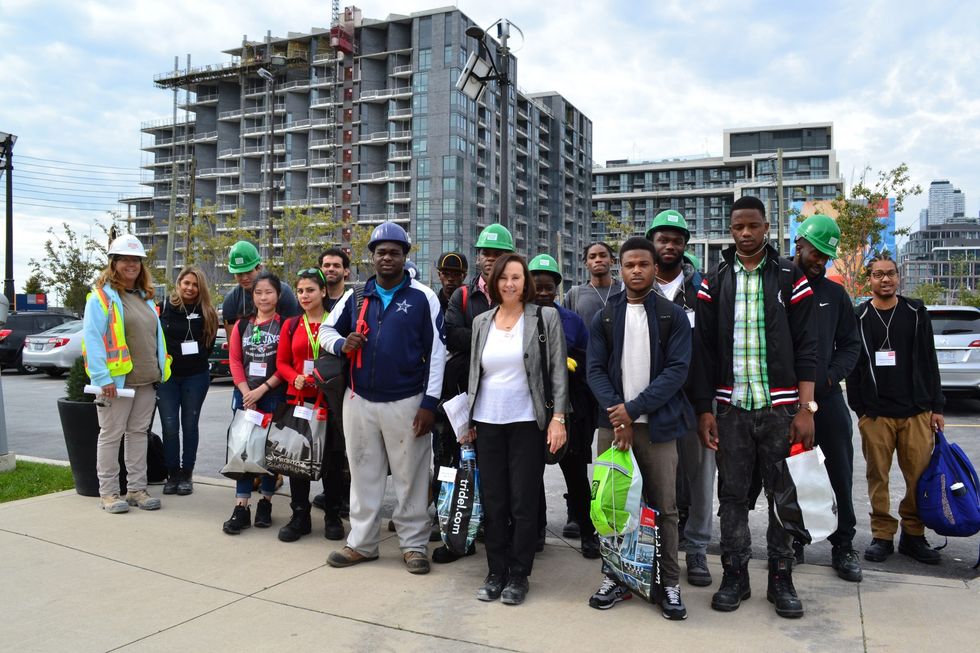
Tell me about your work at BOLT. What does it entail?
I am the executive director of Tridel’s BOLT Charitable Foundation, and BOLT’s mandate is to connect youth to careers in construction by creating awareness and raising funds to provide scholarships and skilled training opportunities for under-resourced youth.
As the executive director, I raise, manage and distribute funds in accordance with the BOLT mandate, in a manner that is transparent and above reproach. I organize Speak Outs in the community to introduce youth to careers in construction, and I establish partnerships with industry, government and the community to provide supports necessary for positive outcomes.
Is construction a good second career — as in, for adults looking to transition into a new industry?
I always tell people that careers are not linear. Most people do not end their careers in the industry or company where they started their careers.
There are so many opportunities in the construction industry and these opportunities go beyond the trades. It is amazing how few people are really aware of the many options that are available in the industry.
My first career had nothing to do with construction and some of my colleagues at Tridel [also] came from very diverse industries.
What advice would you give to someone interested in working in construction?
I would suggest that they research some of the trades and occupations that interest them and speak to people in the industry who are doing that type of work. I find that tradespeople and industry professionals enjoy sharing their experiences and are more than willing to provide valuable information about their career.
The BOLT program offers under-resourced youth with a chance to visit a live construction site and to shadow the trades and management staff for two weeks. This allows them to experience the construction culture, and they and the management staff can assess whether construction is a good fit.
READ: Before Buying Pre-Construction, You Better Know Who You’re Buying From
How do you think the construction industry can attract more female candidates?
We need more women in the industry to share their experiences and to act as mentors and role models. Tridel employs 41 women who are working in construction-related roles. They are employed in the areas of project management, site management, estimating, planning and development, and health and safety.
It is intimidating for women to work on a site in a male-dominated industry. The culture is slowly changing and there have been improvements, but many obstacles still persist. These may include discrimination, lack of respect, lack of appropriate onsite facilities, transportation and daycare issues if there are children involved. More needs to be done to improve the onsite conditions for women.
What makes you proud of your work?
I am thankful that Tridel launched the BOLT program and I am proud that I have been able to assist under-resourced youth to transform their lives through education, training and employment in the construction industry. Without programs like BOLT, many young people living in low-income communities would never have these opportunities.
I am proud of the young people who have now embarked on a rewarding and sustainable career in the construction industry. Many of them have already started giving back by acting as mentors and role models for other young people living in their communities.
